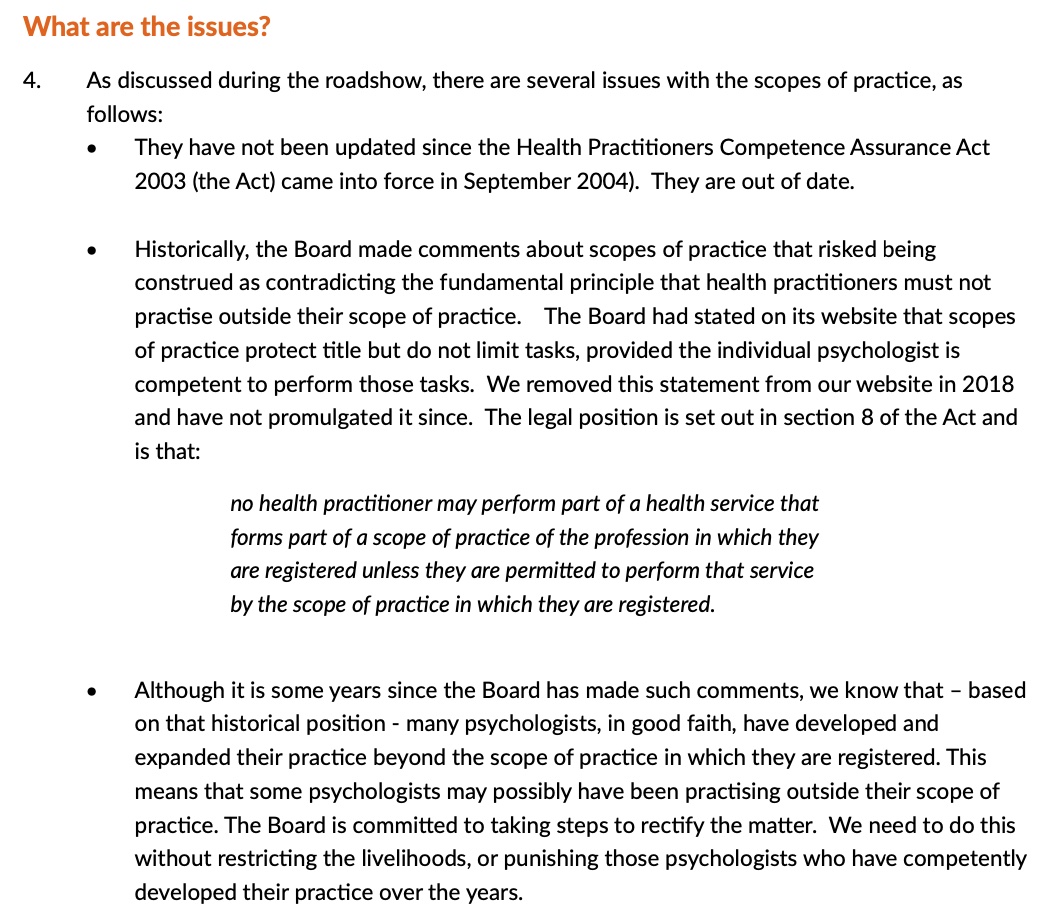The Board released its consultation paper on a proposed new framework for scopes of practice on 6 December 2023. Surprisingly, the paper and proposed framework are premised on an asserted need to rectify a situation for which previous iterations of the Board are said to have been responsible. The Board asserts that ‘historic comments’ by previous iterations of the Board resulted in many psychologists having expanded their practice beyond their registered scope of practice (which, if true, would mean they have been acting unlawfully). In approaching the consultation in this way, the Board is misleading people as to the nature, breadth and longevity of the Board’s ‘historic comments’, and perpetuating and exacerbating misrepresentations as to the nature and breadth of the current scopes of practice.
More...
Summary
On 6 December 2023, the Psychologists Board released its ‘Consultation on scopes of practice – Possible new structure‘. In a nutshell, the consultation paper proceeds on this basis:
- there have been no changes to the scopes of practice;
- but previously the Board was wrong in how it applied the scopes, resulting in many psychologists having “developed and expanded their practice beyond the scope of practice in which they are registered” (this means they would be acting unlawfully, although the Board tries to put this softly by saying “this means that some psychologists may possibly have been practising outside their scope of practice”);
- so the Board is going to ‘rectify’ matters and ‘legally enable’ the workforce;
- but in the meantime the status quo remains, that is, “individual practitioners need to take responsibility for determining whether they are competent to undertake specific psychology services”.
Note, in particular, this paragraph from the consultation paper:

The Board then proposes a new framework for scopes of practice, that comprises the following:
- 5 new scopes;
- a transitional pathway for a finite period (possibly 2 years) for existing, experienced registrants to apply for recognition of prior learning (RPL), in order to be given an endorsement on their scope of practice (currently proposed endorsements being assessment, therapy, and diagnosis);
- once the transitional pathway closes (“from that point forward”), all psychologists must practise only within the bounds of their scope of practice and any endorsement they hold, and all psychologists wishing to obtain an endorsement (i.e., extend their scope of practice) will need to complete a more formalised training pathway recognised by the Board;
- two ‘clusters’ of scopes of practice with separate sets of core competencies to reflect the different pathways that psychology training takes at an early stage, and with each scope within the relevant cluster having additional competencies specific to the scope;
- individuals may be registered in more than one scope of practice, and in one or both clusters (eg, clinical psychologist/neuropsychologist);
- existing scopes of practice will be re-drafted and updated to reflect current training and to be clear on what is in and out of scope. The wording of existing scopes will be reviewed at the same time that new scopes are developed;
- on the topic of changing scopes, the Board says the only pathway to formally change from one scope of practice to another will (for now) be through Board-accredited post-graduate qualifications. Once the legal enablement of the existing workforce has been completed, there will be opportunity to consider alternative ways to change scopes of practice;
- once the new scopes (and their related prescribed qualifications) have been developed and gazetted, and the RPL pathways have been created, the Board will be ready to open the RPL transition process;
- the proposed RPL transition pathway will require psychologists who practise in areas and techniques that were not part of their foundational training to submit a portfolio of evidence to demonstrate that they have grown their practice in a safe, competent and ethical way.
Problems
There are both procedural and substantive problems with the Board’s process and proposed framework. For now we’ll just mention one of the most critical ones: the consultation paper and the proposed new scopes framework rest on an incorrect foundation. Without getting into the detail here at the moment, that incorrect foundation is the Board’s reinterpretation of the scopes of practice, in contrast to how they were originally developed in 2003-2004 and consistently applied by the Board from 2004-2021.
Note the Board’s references to ‘historic comments’ and the ‘statement on the Board’s website’, the Board then saying it removed that statement, and how the paragraph then flows into a summary of section 8 of the Act, followed by the assertion that many psychologists have expanded their practice beyond the scope of practice in which they are registered. In setting up the consultation in this way, we believe the Board is:
- misleading people as to the nature, breadth and longevity of the Board’s ‘historic comments’; and
- perpetuating and exacerbating misrepresentations as to the nature and breadth of the current scopes of practice.
